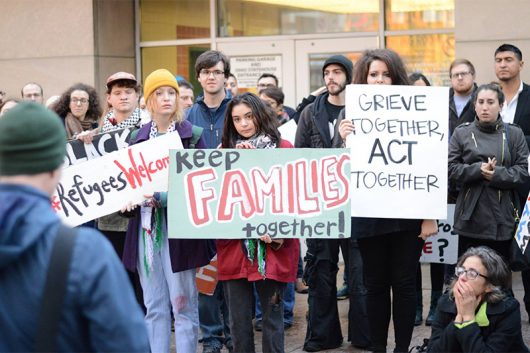
Students and community members gather near the Ohio Statehouse on Nov. 9 for to call on elected leaders and allies to stand against against Donald Trump and his anti-immigration policies. Credit: Courtesy of Matt Hildreth
On Thursday night, immigration lawyers from Slowik & Robinson, LLC and students protected under the Deferred Action for Childhood Arrivals met to discuss the immigration program’s possible future under President-elect Donald Trump.
DACA is an executive order introduced by President Barack Obama in 2012 that protects people who came into the United States undocumented as children. If the person meets the qualifications, any action on their immigration status is paused, which could include deportation, for a renewable period of two years. According to his platform, Trump has pledged to “cancel immediately all illegal and overreaching executive orders,” which, especially given his campaign promises to tamp down on illegal immigration, could include DACA.
Ohio State, like many colleges across the country, has students covered under DACA. OSU spokesman Chris Davey told The Lantern in November that the university isn’t aware how many students are covered by the program.
DACA-covered students have expressed fears of deportation since Trump won the 2016 presidential election, though Kenneth Robinson, an immigration lawyer who spoke on Thursday night, said that immediate changes aren’t likely.
“It is very unlikely that when Trump takes the office, he is going to instantly take away DACA from all of us who have it,” Robinson said.
However, he added that Trump could halt individuals from applying for DACA status or renewing their two-year period.
The Trump campaign did not respond to a request for comment.
Even if DACA were repealed, OSU could still accept foreign nationals who are undocumented. However, Frederick Aldama, an English professor.
“It has been very difficult to have students who currently do not have documentation to come here because … the costs are prohibitive as an international students,” said Aldama, who helped organize Thursday’s event with OSU’s Latino and Latin American Space for Enrichment and Research, an outreach group that focuses on higher education opportunities for Latino high-school students and is also known as LASER.
For international students, OSU estimates the total cost of one academic year at around $50,000, which is two times that of Ohio resident students’ costs. Federal scholarships aren’t available for international students, and a full comprehensive health insurance fee, which for OSU is $ 2,754, is required for every international student.
“(LASER’s) high school students are very anxious, and they don’t know exactly what tomorrow is going to bring, ” Aldama said. “Why bother thinking about college if you don’t even know if you could legal be in this country?”
However, even if the DACA program is repealed, Robinson said people can still have chance to stay in the country through existing legal channels.
“There is due process. If you are picked up and put in the removal process, they can not put you on plane immediately. You can ask to see the immigration judge to have a hearing,” said Robinson. “For someone to have hearing takes several months even years, (and by that time) they may also have released you from removal.”
Nick Roll contributed to this article.


